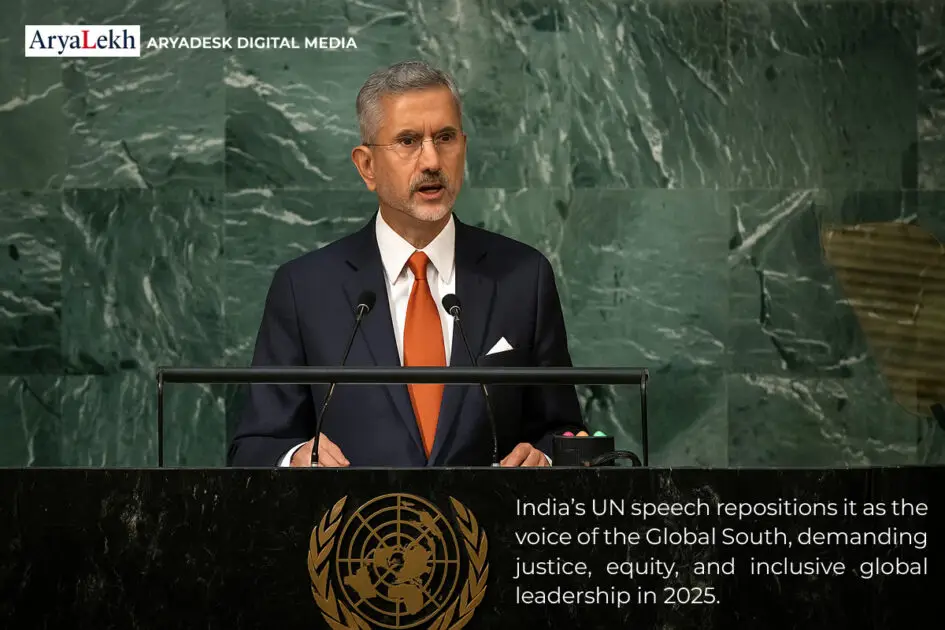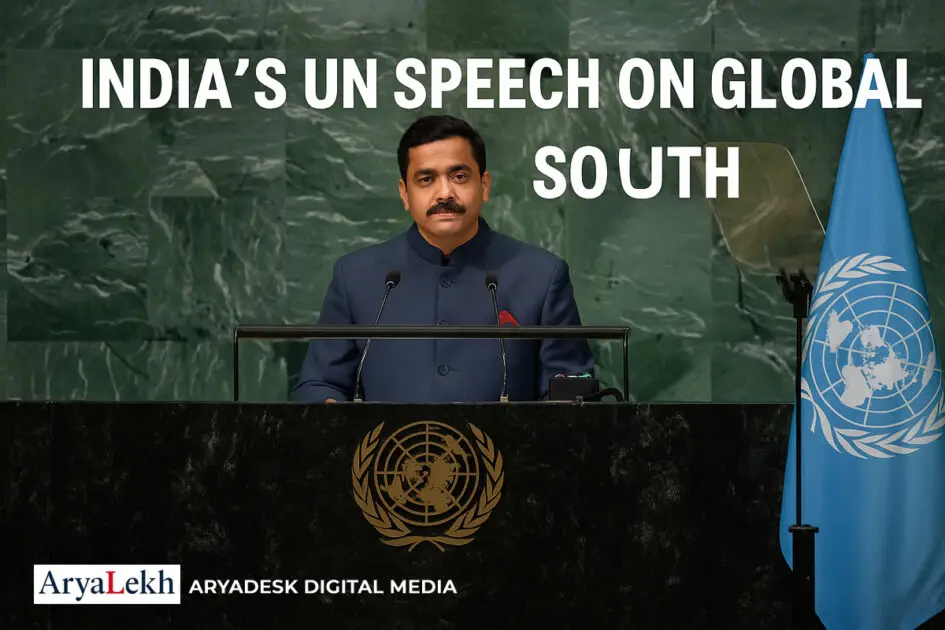India’s UN speech on the Global South signaled a bold transformation in international diplomacy. Rather than aligning with dominant power narratives, India chose to amplify the collective voice of marginalized nations. The address emphasized cooperation over competition, and justice over privilege—calling for digital equity, debt relief, and inclusive global governance.
With calm determination, India framed itself not as a rival to the West or East, but as a unifying force for the Global South. It was a diplomatic assertion rooted in shared histories and common futures—redefining leadership through vision, humility, and the will to represent billions, not just borders.

1. A Speech That Touched Every Corner of the Nation
India UN Speech Global South has become a defining moment in India’s diplomatic journey. The speech, delivered at the United Nations on July 3rd, 2025, echoed far beyond New York. It stirred pride in the hearts of millions across India—from students in classrooms to farmers in distant villages. This was not just a statement of foreign policy but a declaration of solidarity with the world’s developing nations.
2. Why the Global South Matters
India’s recent speech at the United Nations didn’t just echo through diplomatic corridors in New York—it found its way into homes, villages, classrooms, and fields across India. Delivered with clarity and conviction, the speech resonated with the aspirations of the Global South, a collective identity of developing nations seeking fairness, dignity, and representation on the world stage.
A Personal Connection to Policy
On July 3rd, 2025, while the monsoon clouds loomed over Chhattisgarh’s Dhamtari, a young student named Aarti paused her studies to watch her country’s representative at the UN. What she saw wasn’t just a formal address; it was her story, her struggle, and her hope being voiced to the world. India declared: “We speak for billions whose hopes remain unheard.” It was a moment that blurred the distance between rural India and international diplomacy.
3. India’s Demands: Justice, Equity, and Reform
The Global South includes nations from Asia, Africa, Latin America, and Oceania. These are countries rich in culture but historically marginalized in global decisions. They are home to most of the world’s youth and yet remain underrepresented. When India speaks for them, it isn’t out of obligation—it’s out of shared experience. As a nation that has fought colonialism, poverty, and inequality, India’s leadership in this context feels earned, not assumed.
Key Takeaways from the Speech
The UN speech was bold and unapologetic. India called for the reform of the UN Security Council, insisting it must reflect today’s realities. It offered to share its digital public goods—like UPI and CoWIN—with developing nations. It reminded wealthier countries that climate responsibility lies with those who polluted the planet the most. And it demanded debt relief for nations in Africa and Latin America struggling under financial burdens they didn’t create.
4. Global Reactions and Public Sentiment
What made the speech powerful wasn’t just what was said, but how it was said. With empathy. With authority. Without arrogance. It wasn’t about charity—it was about partnership. India reminded the world that leadership isn’t about dominance but about lifting others up.
The World Listened Closely
Reactions were swift. African nations applauded. Many Latin American countries voiced strong support. Western nations, including the US and EU members, responded cautiously—welcoming parts of the speech but sidestepping the call for UN reform. China, notably, remained wary, uncomfortable with India taking the spotlight in representing the Global South.
Everyday People Felt the Impact
But beyond governments, people listened. On social media, young Indians posted messages of pride. In tea stalls and village panchayats, elders discussed how India was finally speaking for people like them. A farmer in Uttar Pradesh was quoted saying, “Ab lagta hai hum bhi duniya mein kuch hain”—Now it feels like we matter in this world.
5. Why This Speech Matters to You and Me
Why does this speech matter to ordinary citizens? Because foreign policy isn’t just about borders; it’s about lives. When India champions digital equality, it opens doors for rural students. When it calls for climate justice, it fights for farmers facing unpredictable rains. When it speaks of fair trade, it empowers artisans, laborers, and small business owners across the country.
A Long Road to Leadership
India’s journey from being a passive observer to an assertive moral leader didn’t happen overnight. It has been built through years of silent service—offering vaccines to neighbours, helping small nations digitally transform, and showing that growth can coexist with responsibility.
What Lies Ahead
Leading the Global South won’t be easy. There will be resistance. There will be expectations. India must continue balancing domestic needs with global responsibilities. It must remain humble, inclusive, and open to collaboration. Its true strength lies not in asserting power, but in inspiring hope.
Conclusion: A New Era in Global Diplomacy
This moment at the UN may one day be remembered not just as a speech, but as the start of a new chapter. One where India doesn’t just speak louder, but speaks wiser. Where it doesn’t just represent itself, but becomes the conscience of many.
In a divided world, India’s message was clear: we’re not here to rule—we’re here to include. And that idea, perhaps, is India’s greatest contribution to global leadership today.



